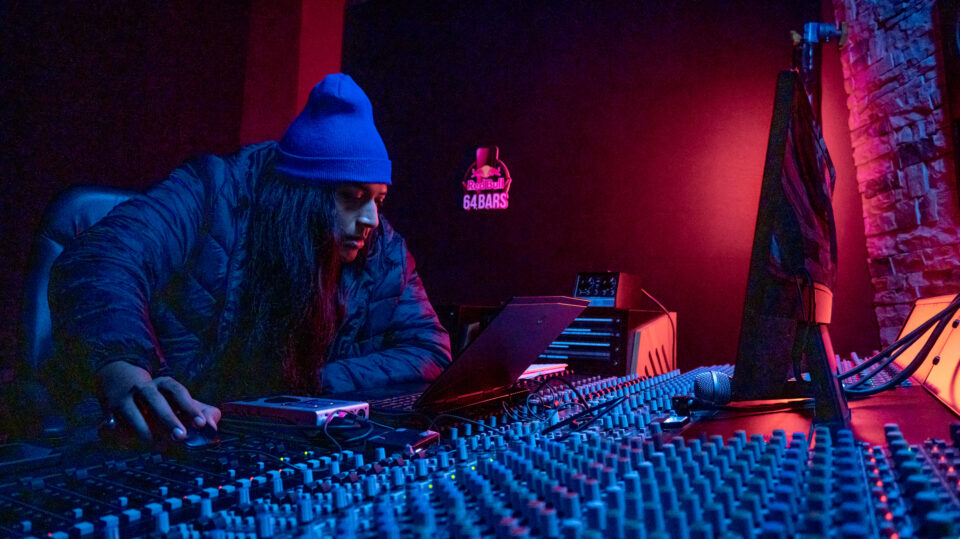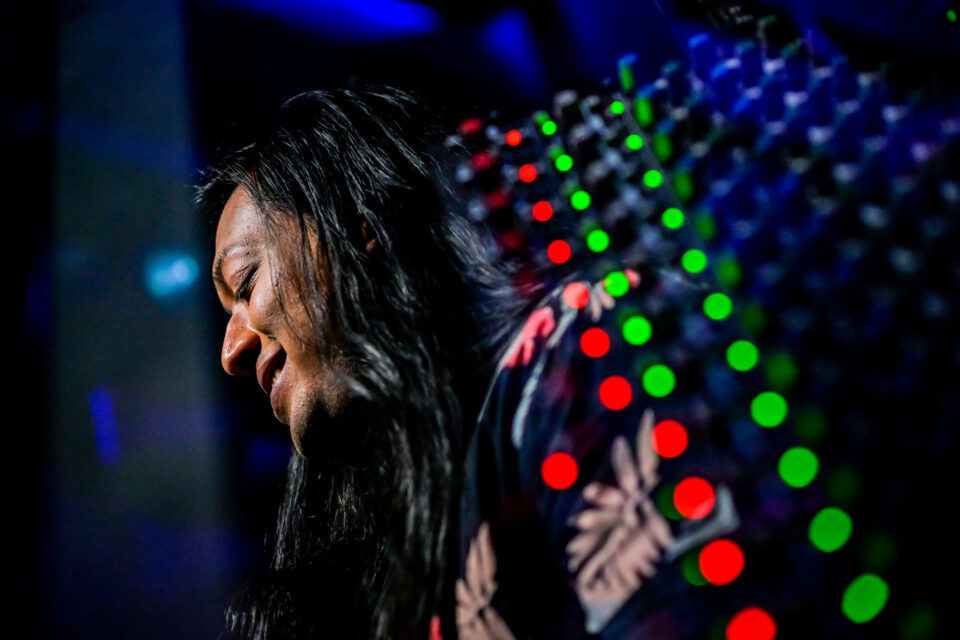
Karan Kanchan
There’s no competition for this composer-producer
At the nexus of India’s burgeoning bass music scene and the pulsating heart of its hip-hop landscape stands Mumbai-based producer Karan Kanchan, a producer whose influence spreads wide. He first focused on “J-Trap” as an homage to his deep-seated admiration for Japanese culture, but Kanchan’s journey into music’s more diverse domains began when he met rapper Naezy in 2017.
Diving into India’s thriving hip-hop scene ever since, it’s not hyperbolic to say Kanchan’s trajectory has been anything short of meteoric. Collaborating with hip-hop superstar DIVINE, joining Gully Gang Entertainment and delivering hits like “Baazigar” solidified his position as a linchpin in the Indian music scene.
There have been a few times Kanchan has got to flex his place in Indian music – from The Karan Kanchan Experience that gathered his favorite artists at Lollapalooza India 2024 to a star-studded Boiler Room set that was off the hook. From bass-heavy trap anthems that quake dancefloors (and break barriers at his Neckwreck gigs) to pop-leaning tunes for artists ranging from Ramya Pothuri to Armaan Malik, Kanchan has a whole lot of hustle in his veins.
Read our interview with Kanchan below:
What got you interested in music production to begin with?
In my family, everyone loves music. It was always around me, Kishore Kumar, Jagjit Singh or even the newer generation like the Kaho Naa… Pyaar Hai movie soundtrack. Cut to when I was in school in the eighth or ninth grade and we had our vacations is when I used to spend a lot of time on the Internet. I would spend a lot of time on YouTube trying out new softwares. On YouTube, I came across this one recommendation which basically turned my entire career for me, and that was the first electronic music song I heard by Diplo and Tiësto, it was called ‘C’Mon’ in 2010. I was very much inspired by seeing one DJ on the stage and there’s this large crowd of people. I couldn’t understand what’s happening because I’ve never seen something like that in India back then. I got curious about it, and I started searching online. Then I got to know you can make it on your laptop and you can use this software to create music. That’s how I got into music in the first place.

I’m interested to know about that Major Lazer concert you attended in 2015 and how it impacted you.
In December 2015, I went to see Major Lazer and I reached at 4:00 PM in the evening. After the show ended is when I realized that all of these artists had their own sound, own presence, own visual identity and I was like, ‘If I was on the stage, what would people take away from me?’ So, on the train ride back home I was thinking that I need to find out what my sound is. So, I dedicated 2016 to completely search for my sound and discover more.
You’ve collaborated with so many artists through the years, what do you think it is that makes so many artists want to work with you?
After working on J-Trap music in 2017 and 2018, I got into hip-hop because of my college friend who gave me a hip-hop sample pack. As soon as you get a new pack, you get really excited and you try to make something new and that same thing happened with me. I started making beats and [hip-hop DJ-producer] The Spindoctor heard it and he sent it to DIVINE and we got connected. Then DJ Proof got me connected with Naezy and Naezy also loved that beat. But Naezy said let’s make a new song together and that’s how ‘Aane De’ came out. It was my first hip-hop song and as a producer to have a first hip-hop song at that time with Naezy was a big deal. I’m able to understand the client’s brief or the artist’s brief much more easily now. I try to focus on building with artists. I have my producer hat on rather than an artist hat on. It’s not about me trying to push what my vision is rather than it is like to collaboratively achieve a good song together.

You recently posted about hitting one billion streams for the music you’ve worked on across platform. How does that make you feel that your music has reached such a wide audience?
It’s so unreal because that number and it’s actually much bigger than that number also, because this is only Spotify and YouTube combined, so it doesn’t consider Apple Music, Gaana and all the other things. So it might be a lot more than that. As an artist and producer, getting some recognition is a big deal because it was not the same couple of years ago. As a producer, you would have to struggle to create an identity between these big artists. I’m glad I’m working with artists who are open to celebrate the producer also, like DIVINE, Armaan Malik, KING, who’s a producer himself. They’re setting an example for the upcoming producers also and I’m glad we’re able to create that space for the producers who are coming up next because it was not the same when I was trying to do it in the start and I’m glad that is changing.
What’s a moment in your career that stands out?
Playing Lollapalooza was definitely a big highlight for sure and the Boiler Room set which we did. It’s funny because Indian festivals didn’t give me a chance at the start, but I got a chance directly with Lollapalooza. So if you’re not getting it now, maybe something better for you is in store. The main thing I learned in this industry was being patient. Other than that, going to this songwriting camp in London through Warner Music was also a really good experience.

How is 2024 shaping up for you?
Towards the end of the year last year, I got a chance to work with a lot of Bollywood artists like Vishal-Shekhar and Pritam and then I also got a chance to do my own Bollywood song [“Ishq Nachaawe” from Kho Gaye Hum Kahan]. Getting back to working on J-Trap music and go back to Japan once again is also my plan. I also have some independent releases with amazing artists and vocalists coming up too.
What according to you is the future of music?
I think now it’s all about how good of a curator or sound selector you are, because making music has become very easy. It’s all about how you get creative. Dropping hit after hit, it’s okay but the only thing that would actually make a difference is on-ground impact or cultural impact. It’s going to be more about involving yourself with your fan base and building a community around your music.




